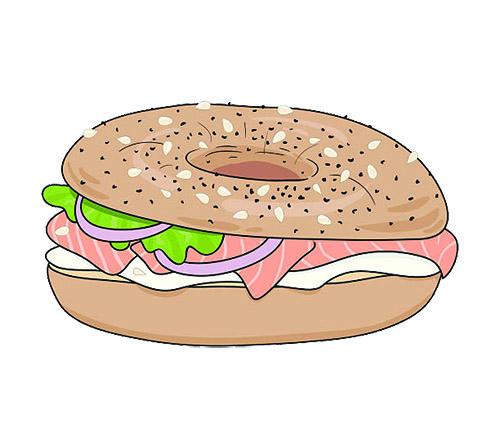
As the Neil Sedaka song goes, “breaking up is hard to do.” Breaking the Yom Kippur fast, however, is not so hard to do. All you have to do is eat or drink and, voilà, you have broken your fast It’s easier than spinning a dreidel, shaking a lulav or dancing the hora. It’s even easier than wishing someone a “Good Shabbos.” (BTW: Who is supposed to go first when wishing someone a “Good Shabbos” and how close does the other person have to be? Must you be able to see the whites of their eyes? Discuss.)
Even if breaking the Yom Kippur fast is not really hard, an argument could be made that it is not really easy either. This is because breaking the fast is not merely about the physical act of consumption; it’s also about how you do it. In other words, it’s both substance and form. Think about it: if you just spent 24 hours repenting for the prior year’s sins, then the last thing you want to do is commit a fresh batch of wrongdoings. This means that, when breaking the fast, you must not think only about yourself but also about the people around you. So, when breaking the fast, take the “me” out of consume and emphasize the “our” in devour.
Before we go any deeper into breaking the fast, let’s review a few ground rules for keeping it.
All adults at or above bar/bat mitzvah age must fast, including pregnant women. (Doesn’t that mean that the fetus also is fasting? Along those lines, if one member of conjoined twins breaks the fast, is the fast also broken for the other attached twin? Discuss.)
Healthy and able-bodied children between the ages 9 and 12 should be encouraged to fast for a short period of time. (They need not skip breakfast altogether but perhaps they should wait until it morphs into brunch.)
Even the elderly and sick should attempt to fast as long as their health is not compromised due to fasting. (That said, having the common cold is not a valid reason to skip the fast. Come to think of it, even having an uncommon cold may not be a valid excuse.)
Now that we’ve covered the basics for fasting, let’s dive into breaking the fast.
There is no particular food that must be eaten, though bagels and lox have become standard post-fast fare. There also is no particular person with whom you must break the fast. You need not break the fast with your parents, rabbi or social media followers. In fact, you can break the fast all by your lonesome but if you do so then, practically speaking, to whom are you going to complain that you ate way too much? Who will call you a fool when you pathetically lament that fourth and wholly unnecessary bagel?
The most important aspect of breaking the fast is doing it without breaking other things including the rules of decency and proper conduct. Here are some cautionary, hypothetical examples:
1. You hustle over to a basket of bagels, hoping to secure one of the pumpernickel variety. You quickly snatch the last one before anyone else is the wiser but it then dawns on you that your father is a pumpernickel fanatic too. If you willfully ignore your father’s best interests and down that pumpernickel bagel, you arguably have committed your first sin of the new year by failing to “honor your father and mother.” (Exodus 20:12) So, put the pumpernickel bagel back in the basket, grab a less interesting poppy or sesame bagel and consume it guilt-free.
2. It’s midway through the meal when you decide to pull a “supernova,” i.e., to load you bagel with mountains of nova lox. As you aggressively and selfishly pile the phenomenal fish with reckless abandon, it becomes painfully clear that the smoked salmon supply on the table will be depleted with no hope of replenishment. If you continue down this path, you will have broken the Golden Rule: “Love your neighbor as you love yourself.” (Leviticus 19:18 and Talmud Shabbat 31a)
3. You continue loading up your plate with impossible portions, well beyond reason and your appetite. You are now well past the point of being satiated and even professional, competitive eaters are appalled. You have just violated the Talmudic admonition against gluttony: “[A] person who is a glutton and a drunkard, and sleeps a lot due to his excessive eating and drinking, will end up poor and dressed in rags.” (Sanhedrin 71a)
4. You watch your friend attack the lox platter and horde way more than his fair share. You loudly proclaim that he lacks the gravlax gravitas to stake such a claim. Your red-faced friend is now a shade or two redder than the lox and you have violated the Talmudic rule prohibiting public embarrassment. (Baba Metzia 58b).
Final thought: Don’t stress when you fres, but don’t cheat when you eat.
By Jon Kranz













